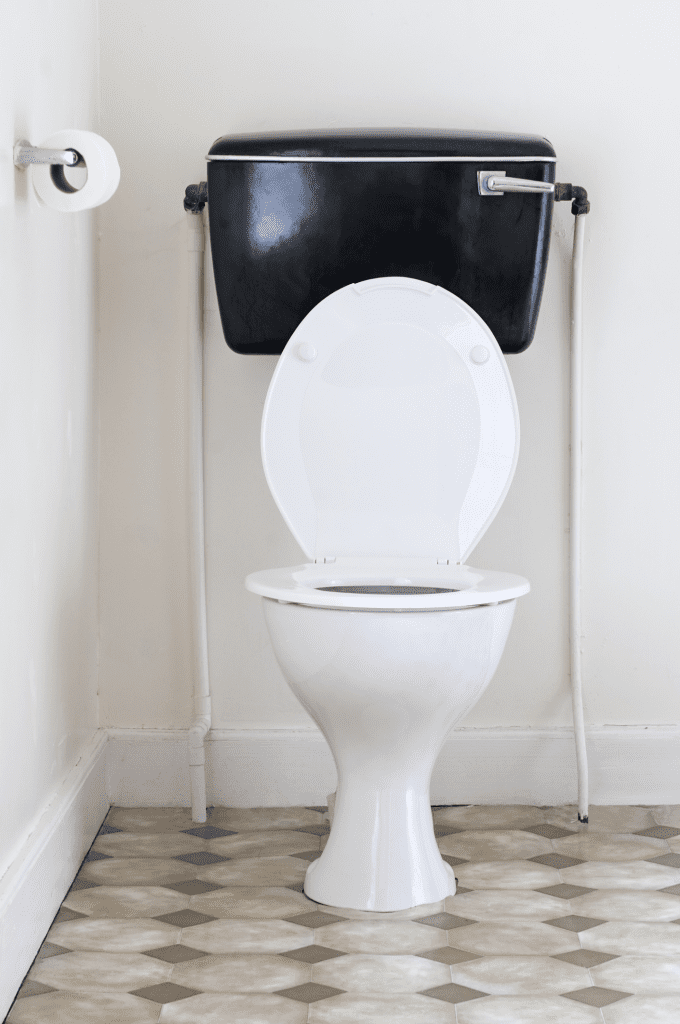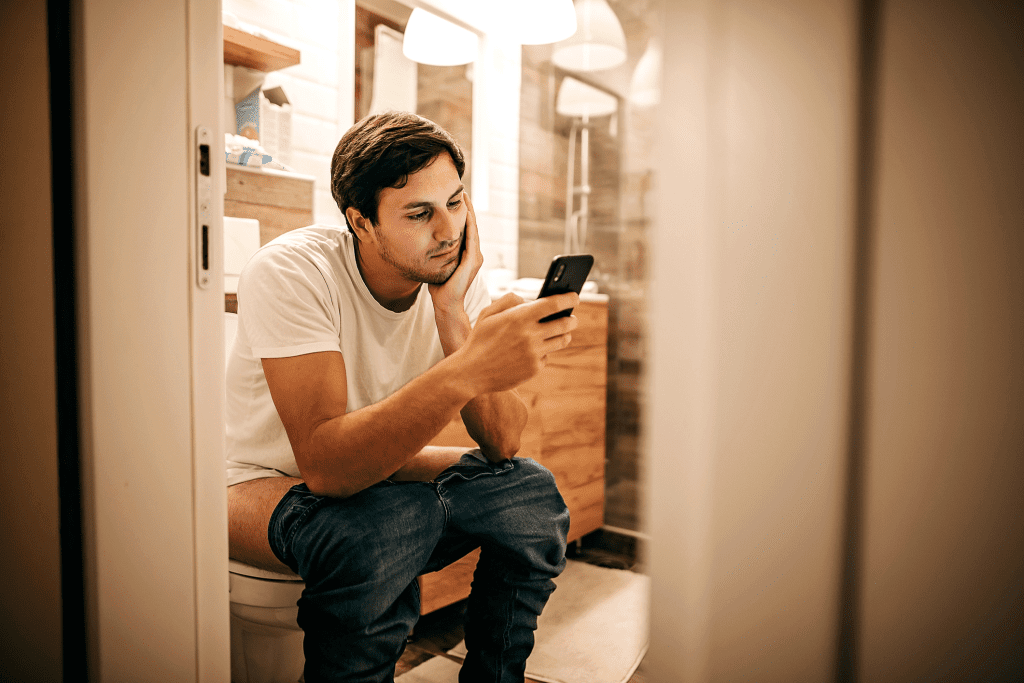Let’s be honest—most of us are guilty of spending a little too long on the toilet. Whether it’s catching up on social media, reading a magazine, or just taking a breather, it seems like no big deal. But according to health experts, sitting on the toilet for extended periods can actually be harmful. Dr. Roshini Raj, a gastroenterologist at NYU Langone, has issued a warning: spending more than 10 minutes on the toilet could lead to some uncomfortable and even painful health issues.
The Harmful Effects of Sitting on the Toilet Too Long

While it may seem harmless, prolonged time on the toilet can have negative consequences on your body. Sitting in this position for too long can increase the risk of developing hemorrhoids and cause other uncomfortable issues in the anorectal area. Here’s a closer look at how these problems arise and why spending too much time on the toilet is best avoided.
1. Increased Pressure on the Rectal Area
The design of modern toilets plays a role in the potential harm. Dr. Raj explains that when you sit on a toilet, your thighs support part of your weight, but the anorectal area essentially hangs lower. This position causes gravity to exert pressure on the veins in your rectal area, potentially leading to:
- Hemorrhoids: Prolonged pressure can cause hemorrhoids, which are swollen veins in the rectum or anus. They can become inflamed, painful, and even lead to bleeding.
- Anal Fissures: The extra pressure can also increase the risk of developing small tears in the anal lining, known as fissures. These can be painful and take a long time to heal.
Over time, this extra strain on the lower body can lead to a range of uncomfortable conditions, which is why doctors recommend limiting your toilet time to a maximum of 10 minutes.
2. The Impact of Bathroom Habits on Your Digestive Health
Many people unknowingly worsen their digestive health by lingering on the toilet. Spending extended periods on the toilet can create a habit of unnecessary straining, which has repercussions for your digestive system:
- Encourages Constipation: If you’re taking your phone or a book to the bathroom, you may end up sitting there for longer than you need to. This can disrupt the natural process of your bowel movements, making you more prone to constipation.
- Weakens Pelvic Floor Muscles: Frequent straining can weaken the pelvic floor muscles over time. This is especially problematic for women, as weak pelvic muscles can lead to urinary incontinence and other pelvic floor disorders.
Your body needs to keep your digestive system running smoothly, and spending too long on the toilet interrupts this process. In other words, the toilet is meant for doing your business—not lounging!
3. The Hygiene Risk of Using Your Phone on the Toilet
It’s no surprise that bathroom hygiene is an issue if you’re using your phone on the toilet. According to a study by NordVPN, 65% of people admit to taking their phone with them to the toilet. However, using your phone in the bathroom can lead to unhygienic consequences:
- Cross-Contamination: Restroom surfaces can harbor bacteria and viruses. When you touch your phone in the bathroom, you’re risking contamination and transferring germs to an item you regularly handle. This can increase the risk of food poisoning and other infections.
- Poor Hand Hygiene: Distractions like your phone can lead to less thorough hand washing. You might not realize it, but if you’re distracted, there’s a higher chance of neglecting proper hand hygiene, leaving you more susceptible to illness.
While it’s tempting to bring your phone along, it’s best to leave it outside the bathroom to reduce the risk of cross-contamination and protect your health.
4. The Link Between Sitting Too Long and Hemorrhoids

Hemorrhoids are one of the most common issues associated with prolonged toilet sitting. They occur when veins in the rectum become swollen, often due to straining or increased pressure. While hemorrhoids can develop outside of toilet habits, spending long periods sitting on the toilet definitely contributes to the risk.
- Symptoms of Hemorrhoids: Common symptoms include itching, discomfort, and in some cases, bleeding. Chronic hemorrhoids can lead to more serious complications, like blood clots or infections.
- Preventative Measures: The best way to prevent hemorrhoids is to limit your toilet time. Instead of sitting for long periods, make sure you’re drinking plenty of water and eating a high-fiber diet, both of which help ensure regular and easier bowel movements.
5. The Psychology of Toilet Time: Why We Linger Longer Than Necessary
Believe it or not, sitting on the toilet can feel like a quiet escape. Many people use the bathroom as a place to relax or decompress, especially if it’s the only room where they can find peace and quiet. This psychological aspect can lead to longer-than-necessary toilet time, but here’s why it’s important to break this habit:
- Mindfulness and Relaxation: While it’s okay to take a breather, find other ways to relax. Take breaks outside, meditate, or unwind in a comfortable chair. Using the bathroom for relaxation can train your body to feel the urge to go even when it’s not necessary.
- Limiting Distractions: Reducing distractions like your phone can help you focus on the task at hand and minimize your time in the bathroom. Make an effort to reserve bathroom time for bathroom activities only.
6. How to Improve Your Bathroom Routine for Better Health

So, how can you ensure a healthier, more efficient bathroom routine? Start with these simple tips:
- Leave Your Phone Outside: Create a rule for yourself—no phones in the bathroom. By doing this, you’ll spend less time sitting and reduce the risk of germ contamination on your devices.
- Set a Timer: If you tend to lose track of time, set a timer for 10 minutes or less. This can help you get into the habit of shorter, more efficient bathroom visits.
- Practice Good Posture: Sit up straight with your feet flat on the floor. Some people find that using a small stool to raise their feet can improve their posture, align the rectum, and make bowel movements easier and quicker.
- Adopt a High-Fiber Diet: Consuming more fiber-rich foods and staying hydrated can prevent constipation and reduce the time you need to spend on the toilet in the first place.
Conclusion: Your Health is Worth the Few Extra Minutes
Sitting on the toilet for longer than 10 minutes may seem harmless, but it can have real impacts on your health. From increasing your risk of hemorrhoids to promoting poor bathroom hygiene, lingering too long on the toilet is a habit worth breaking. By making small adjustments to your routine, such as setting time limits, avoiding distractions, and practicing good posture, you can protect your digestive health and improve your overall well-being.
So, next time you find yourself settling in for a scroll on the loo, think twice! Your body will thank you for making those necessary changes—and you might find you feel healthier, more energized, and better overall.


